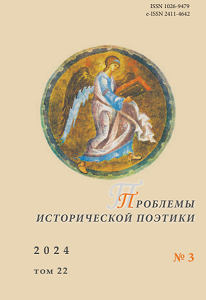Функция постоянных эпитетов в поэтике былины
The Function of Constant Epithets in the Poetics of the Bylina
Author(s): Irina P. ChernousovaSubject(s): Customs / Folklore, Studies of Literature, Russian Literature, Stylistics
Published by: Петрозаводский государственный университет
Keywords: folklore; bylina; genre poetics; constant epithet; types of epithets; formula; concepts; conceptual sphere; epic tale worldview;
Summary/Abstract: The article analyses constant epithets in the poetics of the bylina and determines their function in the creation of an epic worldview as an ideal, aesthetically transformed version of reality. The study of constant epithets, which accumulate folk ideals and values selected and polished by the longtime folklore tradition, made it possible to discover what the Russians think about, how they characterise and assess people, objects and phenomena of the surrounding world in terms of their perfection. The identified traditional meanings of statements with constant epithets, which demonstrate the ideal correspondence of an object and its characteristic to the norm in the epic worldview, participate in shaping the images of the Motherland, its defenders and the entire representational system of “one’s” epic world. For example, the set phrases “the land of Holy Russia,” “Orthodox/Christian faith,” “God’s/cathedral/ the Lord’s churches,” “saved monasteries,” “life-giving crosses” create the image of Holy Rus’; the series of the constant epithets “daring, portly, good youth” and “strong mighty bohatyrs of the Holy Rus” express the totality of physical and moral qualities that the defender of his native land, glorified in the epic, should possess; an “honouring feast” means a feast at which heroes are honored for their victories. The constant epithets “glorious,” “great,” “fair” that are often used to characterise oikonyms, indicating their fame, greatness and beauty, contribute to the celebration and glorification of Russian cities that embody the Russian land. Traditional cultural meanings (concepts), which are part of the folklore undergo a transformation, becoming meaningful constants of the epic picture of the world. For example, a hat/cap of the Greek land is a wonderworking object that functions as a military weapon, used by a bohatyr to defeat the enemy. The proposed approach to the study of constant epithets, which considers the mental existence of oral poetic invariables and the attitude to folklore as a worldview phenomenon, contributes to a better comprehension of the Russian epic.
Journal: Проблемы исторической поэтики
- Issue Year: 22/2024
- Issue No: 3
- Page Range: 7-25
- Page Count: 19
- Language: Russian

